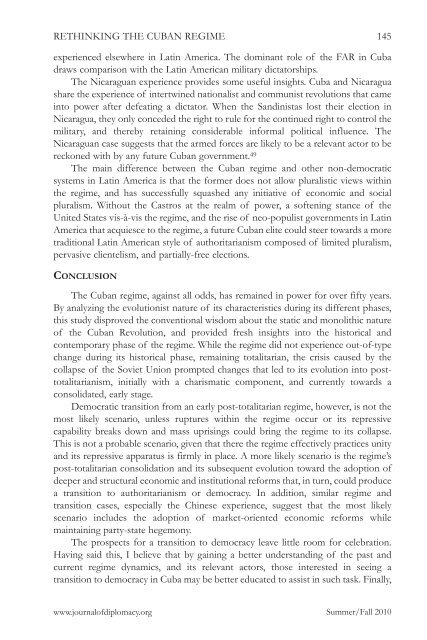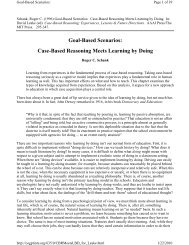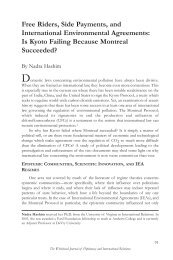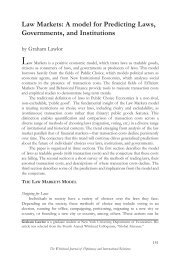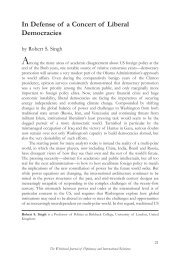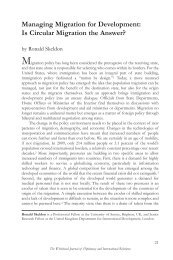Rethinking the Cuban Regime: Implications for Transition Paths and ...
Rethinking the Cuban Regime: Implications for Transition Paths and ...
Rethinking the Cuban Regime: Implications for Transition Paths and ...
Create successful ePaper yourself
Turn your PDF publications into a flip-book with our unique Google optimized e-Paper software.
REThInkIng ThE CUbAn REgIME<br />
experienced elsewhere in Latin America. The dominant role of <strong>the</strong> FAR in Cuba<br />
draws comparison with <strong>the</strong> Latin American military dictatorships.<br />
The nicaraguan experience provides some useful insights. Cuba <strong>and</strong> nicaragua<br />
share <strong>the</strong> experience of intertwined nationalist <strong>and</strong> communist revolutions that came<br />
into power after defeating a dictator. When <strong>the</strong> S<strong>and</strong>inistas lost <strong>the</strong>ir election in<br />
nicaragua, <strong>the</strong>y only conceded <strong>the</strong> right to rule <strong>for</strong> <strong>the</strong> continued right to control <strong>the</strong><br />
military, <strong>and</strong> <strong>the</strong>reby retaining considerable in<strong>for</strong>mal political influence. The<br />
nicaraguan case suggests that <strong>the</strong> armed <strong>for</strong>ces are likely to be a relevant actor to be<br />
reckoned with by any future <strong>Cuban</strong> government. 49<br />
The main difference between <strong>the</strong> <strong>Cuban</strong> regime <strong>and</strong> o<strong>the</strong>r non-democratic<br />
systems in Latin America is that <strong>the</strong> <strong>for</strong>mer does not allow pluralistic views within<br />
<strong>the</strong> regime, <strong>and</strong> has successfully squashed any initiative of economic <strong>and</strong> social<br />
pluralism. Without <strong>the</strong> Castros at <strong>the</strong> realm of power, a softening stance of <strong>the</strong><br />
United States vis-à-vis <strong>the</strong> regime, <strong>and</strong> <strong>the</strong> rise of neo-populist governments in Latin<br />
America that acquiesce to <strong>the</strong> regime, a future <strong>Cuban</strong> elite could steer towards a more<br />
traditional Latin American style of authoritarianism composed of limited pluralism,<br />
pervasive clientelism, <strong>and</strong> partially-free elections.<br />
ConCLusIon<br />
The <strong>Cuban</strong> regime, against all odds, has remained in power <strong>for</strong> over fifty years.<br />
by analyzing <strong>the</strong> evolutionist nature of its characteristics during its different phases,<br />
this study disproved <strong>the</strong> conventional wisdom about <strong>the</strong> static <strong>and</strong> monolithic nature<br />
of <strong>the</strong> <strong>Cuban</strong> Revolution, <strong>and</strong> provided fresh insights into <strong>the</strong> historical <strong>and</strong><br />
contemporary phase of <strong>the</strong> regime. While <strong>the</strong> regime did not experience out-of-type<br />
change during its historical phase, remaining totalitarian, <strong>the</strong> crisis caused by <strong>the</strong><br />
collapse of <strong>the</strong> Soviet Union prompted changes that led to its evolution into posttotalitarianism,<br />
initially with a charismatic component, <strong>and</strong> currently towards a<br />
consolidated, early stage.<br />
Democratic transition from an early post-totalitarian regime, however, is not <strong>the</strong><br />
most likely scenario, unless ruptures within <strong>the</strong> regime occur or its repressive<br />
capability breaks down <strong>and</strong> mass uprisings could bring <strong>the</strong> regime to its collapse.<br />
This is not a probable scenario, given that <strong>the</strong>re <strong>the</strong> regime effectively practices unity<br />
<strong>and</strong> its repressive apparatus is firmly in place. A more likely scenario is <strong>the</strong> regime’s<br />
post-totalitarian consolidation <strong>and</strong> its subsequent evolution toward <strong>the</strong> adoption of<br />
deeper <strong>and</strong> structural economic <strong>and</strong> institutional re<strong>for</strong>ms that, in turn, could produce<br />
a transition to authoritarianism or democracy. In addition, similar regime <strong>and</strong><br />
transition cases, especially <strong>the</strong> Chinese experience, suggest that <strong>the</strong> most likely<br />
scenario includes <strong>the</strong> adoption of market-oriented economic re<strong>for</strong>ms while<br />
maintaining party-state hegemony.<br />
The prospects <strong>for</strong> a transition to democracy leave little room <strong>for</strong> celebration.<br />
having said this, I believe that by gaining a better underst<strong>and</strong>ing of <strong>the</strong> past <strong>and</strong><br />
current regime dynamics, <strong>and</strong> its relevant actors, those interested in seeing a<br />
transition to democracy in Cuba may be better educated to assist in such task. Finally,<br />
www.journalofdiplomacy.org<br />
145<br />
Summer/Fall 2010


